I Like __ A Lot
Five Works of Criticism You Should Consider Reading
“Criticism is itself an art.” – Oscar Wilde
A couple of months ago I shared a list of “Five Works of Theory You Should Consider Reading,” at least two fifths of which could also easily be described as criticism (Glas viz Genet, and Crack Wars viz Flaubert, for sure). Boundaries, of course, are porous.
As if it’s not obvious, I love reading theory and criticism. Two forthcoming books I can’t wait to read are Kate Zambreno’s Heroines (Semiotext(e) / Active Agents) and Sianne Ngai’s Our Aesthetic Categories: Zany, Cute, Interesting
(Harvard University Press), both due out in October. Criticism? Theory? Poetry, fiction, autobiography? If their previous work is any indication, the only label worth applying will be “badass.”
Similar to my theory choices, I could’ve picked a hundred dozen or more, so limiting myself to five seems like a good, if difficult, idea. And, like last time, I cheated and added a bunch of alternative choices within the five major choices. Ah the joy of making up the rules as you go.
For the most part, I chose the books I chose because I like them for the way they play with genre, the way they enact formal deterritorialization, the way they make the criticism itself a work of art, or as Wilde puts it in the essay I quoted from above, “It treats the work of art simply as a starting-point for a new creation.”
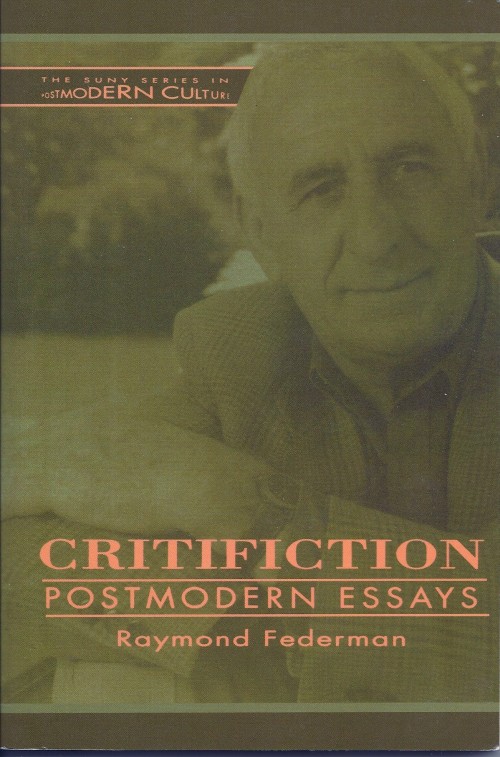
Critifiction: Postmodern Essays
by Raymond Federman
I considered selecting Ronald Sukenick’s In Form: Digressions on the Act of Fiction instead of Federman’s book, given that both are affiliated with FC2. I love both books, but I think Federman’s presents more formal creativity. Both offer a host of insightful criticism and interesting ideas about 20th century literature. Together, they would be a nice double feature.
It’s a slim volume, only like 130 pages, but Federman has such a sass, such an inflated ego, such moxie, its size does not equate to its impact. My favorite chapter is called “What are Experimental Novels and Why Are So Many Left Unread?” Another superb chapter is called “Self-Reflective Fiction Or How to Get Rid of It.” But from start to finish, it’s a super fun and smart formal roller coaster, as you might expect from the man who produced the two masterworks Take It or Leave It and Double or Nothing
.
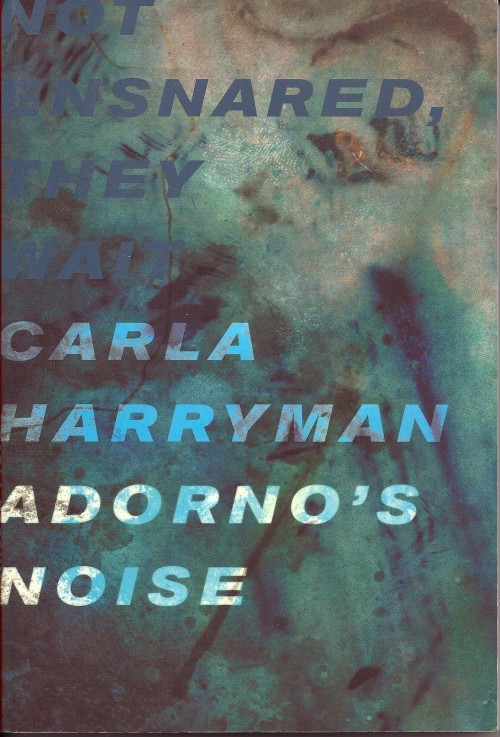
Adorno’s Noise
by Carla Harryman
Reviewing this book for Raintaxi, Kit Robinson calls it, “An attractive and difficult work [that] doesn’t fit neatly into any preconceived categories; it straddles the boundaries of essay, journal, performance, poem, and play.” Further along Robinson writes, “Harryman’s thought stretches out in so many directions it hard to know where to start. Indeed, Adorno’s Noise seems to perform a kind of essayistic yoga, creating new spaces inside the body that knows. Since the known is always bordered by the unknown, the work has a kind of erotic charge, as desire vies with security for the attention of the mortal. New spaces are continuously opened up then occupied, leading to a series of encounters.”
Presently, I’m on a Harryman kick. Her stuff is dizzying. If you haven’t read her before, now is a great time to check her out. For those interested in radical departures from convention, this book is (all her books are, really) indispensable.
That said, I was this close to selecting Dodie Bellamy’s Barf Manifesto instead of Harryman’s book, even though physically it’s the size of a chapbook, because Bellamy packs the small space so full of rich intensity it too is indispensable. I have not read Bellamy’s longer work of essayism Academonia yet, but I hear it slays. You can read an essay from it called “Body Language” online at Fascicle. In the final paragraph of that essay she offers an amazing reading list of authors who, as she describes it, “celebrate vulgarity and emotion, and, yes, even sarcasm.” If you haven’t gotten into Bellamy’s work, you should consider it, too. Her stuff is juicy awesome.
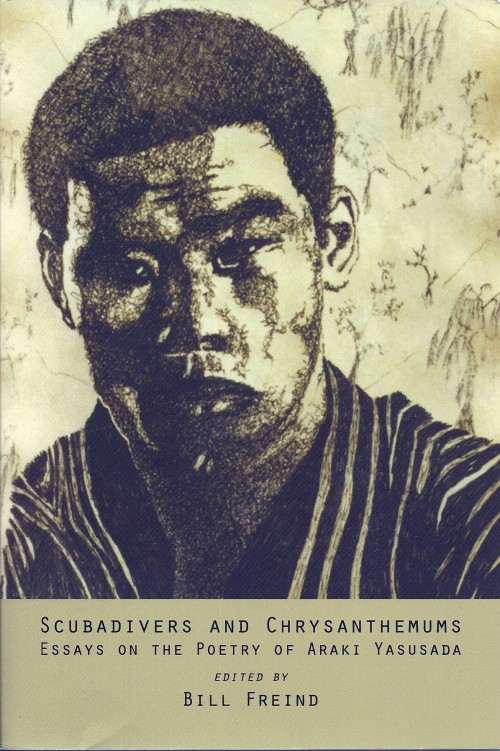
Scubadivers and Chrysanthemums: Essays on the Poetry of Araki Yasusada
edited by Bill Freind
This recently released collection from Shearsman Books includes essays by William Freind, Eliot Weinberger, Marjorie Perloff, Forrest Gander, Mikhail Epstein, Kent Johnson, Brian McHale, Paisley Rekdal, Jenny Boully, Alex Verdolini, Eric R. J. Hayot, Jacob Edmond, Martin Corless-Smith, Farid Matuk, David Rosenberg, David Wojahn, Hosea Hirata and Dan Hoy.
The poetry of Araki Yasusada, collected and published by Roof Books in 1997 under the title Doubled Flowering: From the Notebooks of Araki Yasusada, has been described as “the most controversial poetry book since Allen Ginsberg’s Howl.” If you’re unfamiliar with the controversy surround Yasusada, get filled in by reading this piece by Emily Nussbaum. Basically, the American poet and scholar Kent Johnson presented Yasusada’s work, but then debate ensued over the authenticity of the work. Speculation swirled about the possibility that Johnson himself was the author of the work, although to my knowledge he has never claimed authorship of it. To me, the whole thing is fascinating on a bunch of levels.
Anyway, this collection is captivating in the way a mystery novel is captivating: encouraging the reader to constantly question what is real and what is fake, what is fact and what is fiction, and what might happen next.
Dan Hoy’s contribution, “This is a City with No Person: Authorial Voids among the Mess of Meta-Hyperawareness,” is wicked cool. It’s like an outline of footnotes within footnotes. Jenny Boully’s contribution, “Here is the offering of a sacred name…,” is, like all of her work, beautiful poetic and engaging.
With all this recent brouhaha over “Sincerity” or “New Sincerity” or “Old Sincerity” or “Seriously Sincere Sincerity” or whatever, Yasusada’s work and this collection seem compellingly relevant.
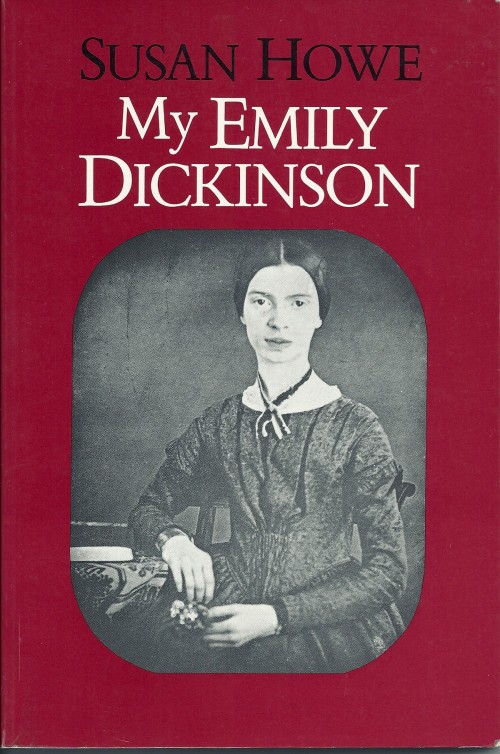
My Emily Dickinson
by Susan Howe
In the realm of poetry criticism, many worthy selections come to mind, from Daniel Tiffany’s reanimation of the modernist image in Radio Corpse: Imagism and the Cryptaesthetic of Ezra Pound to Evie Shockley’s important reframing of “black aesthetics” in Renegade Poetics: Black Aesthetics and Formal Innovation in African American Poetry
to Charles Bernstein’s A Poetics
to Lyn Hejinian’s The Language of Inquiry
to any number of Marjorie Perloff’s books or Gerald Bruns’s books, the list obviously goes on and on.
I selected this one because of how it does what Wilde suggests great criticism does: it illustrates marvelously the possibilities of poet-on-poet engagement. It goes beyond mere criticism, by becoming essay, memoir, biography, analysis, poetry, and more. “A great poet, carrying the antique imagination of her fathers, requires each reader to leap from a place of certain signification, to a new situation, undiscovered and foreign,” writes Howe, “She carries intelligence of the past into the future of our thought by reverence and revolt.”
You can read an excerpt from it here and here.
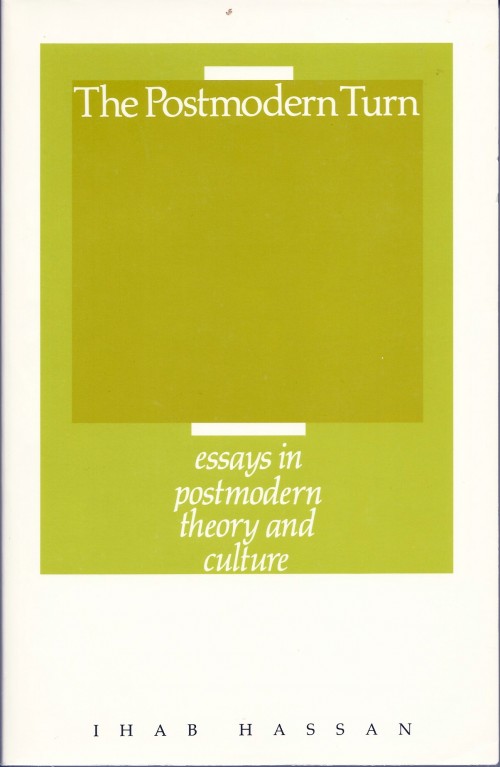
The Postmodern Turn: Essays in Postmodern Theory and Culture
by Ihab Haasan
When it comes to Postmodern criticism, there are so many good books that deserve recognition. For instance, one of my mentors, Brian McHale, wrote a phenomenal book of criticism called simply Postmodernist Fiction, that is both amazingly written and a seminal text in the field. (It’s the book where he distinguishes between Modernist texts and Postmodernist texts by suggesting that the former is dominated by questions of epistemology while the later by questions of ontology, through looking at works from Faulkner and Borges and Robbe-Grillet, etc. — but it also has chapters on worlding, intertextual zones, sci-fi, and loads of other cool things.)
The reason I’ve chosen Hassan’s book over McHale’s book (and other possible titles) is because of the formal creativity it exhibits. The text itself performs at such a high intensity of playfulness, it often shocks a reader expecting academic convention. For someone keen on exploring possibilities in style, Hassan presents a great encouragement. His book says: if you want to write wildly, write wildly. (In fact, I’d argue that all five of the books I’ve selected say this same thing but in different ways.)
I should mention, I was this close to selecting Steven Shaviro’s Doom Patrols: A Theoretical Fiction about Postmodernism in place of Hassan’s book, but at the last minute I chose Hassan. Shaviro’s book is very interesting because of its approach, not only that it incorporates comic books and comic book characters alongside other fictional and nonfictional characters, but because it’s so narrative rather than argumentative. For readers who might tend to shy away from criticism that’s explicitly criticism, Shaviro’s book would be a welcome treat. From it, you get keen analysis and commentary, but it’s delivered in a more familiar and palatable form than most “criticism.”

Dig it! Added these to my list. Thank you, Chris.
I’m worried that some of these books might interpret, analyze, or discuss meaning.
“Interpretation is a bankrupt practice”–Higgs.
Two weeks later…
“Here are some interpretative texts you should read”–Higgs
Thanks, Chris, for writing about the Yasusada essay book. Bill Freind did a really fine job putting it together. And nice to have the book, too, mentioned within such good company. Just a note: Freind did try to get permission to reprint more essays from the “anti” side of things, but was turned down at every turn, not excluding by some prominent names who’ve published pretty harsh pronouncements. To my knowledge, none of them really explained why they declined. So if the anthology seems weighted to the sympathetic perspective, which I guess it is (with a couple exceptions), that is why.
My pleasure, Kent. It’s a fascinating book.
I love criticism. In my lit classes the student and teacher always concluded that the Democrat Party is the superior party. It didn’t matter which book we read.
Glad to see the essays on Yasusada book lauded here. DOUBLED FLOWERING is my favorite book to recommend to everyone I can get to talk to me about poetry in a bar, along with THE BATTLEFIELD WHERE THE MOON SAYS I LOVE YOU and LET US NOW PRAISE FAMOUS MEN. Yasusada is in the same wild company.